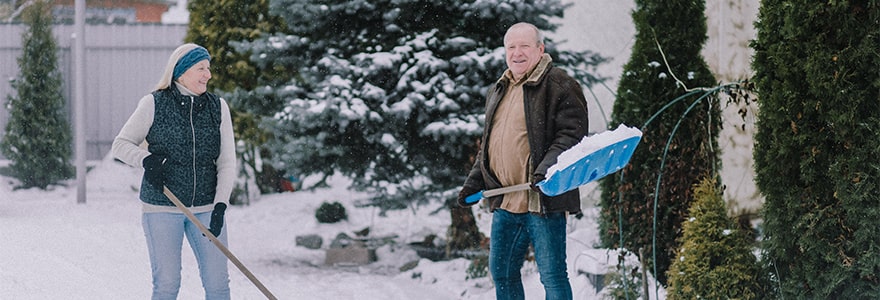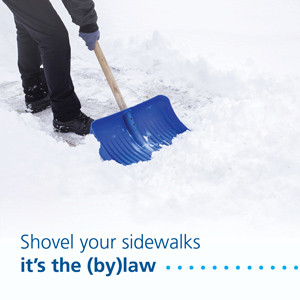Resident Guide to Winter Weather

Snow Angels Program
Need help shoveling snow this winter or want to lend a hand? The Snow Angels Program pairs volunteers with neighbours who are elderly, ill, or have mobility challenges and need help clearing sidewalks after heavy snowfall.
Learn more or sign up at richmond.ca/SnowAngels
During a Snow Storm
- Shovel early and often—new snow is lighter than packed or partially melted snow.
- Do not shovel snow onto sidewalks or the roadway—this is a hazard to pedestrians and vehicles.
- To avoid clearing your driveway twice, pile snow on the left side (facing your house) to minimize snow pushed back by plows.
- Avoid parking on the road during or after a storm to allow plows to clear streets effectively.
- If possible, stay off the roads until conditions improve.
- Use transit when possible; Richmond’s bus routes are prioritized for snow clearing.
- Check City's Intersection Cameras for real-time traffic conditions.
- Before driving, clear all snow from windows, lights, hood and roof.
- Stay at least 15 metres behind snowplows for safety.
- Keep fire hydrants clear of snow for emergencies.
- Help garbage and recycling crews by clearing a small path for carts. This improves safety for our crews and helps prevent collection service delays for other residents.
Shovel Your Sidewalks
 Residents, business owners and developers must clear sidewalks by 10:00am daily per City Bylaw 5870.
Residents, business owners and developers must clear sidewalks by 10:00am daily per City Bylaw 5870.
- residential, commercial, and industrial properties
- undeveloped and under-construction properties
Tips for shoveling:
- Shovel snow onto your property, not the road or sidewalk.
- Clear storm drains to prevent localized flooding.
- Arrange for assistance if you are unable to shovel.
Shovel Your Sidewalks Poster
How to report an issue in your area:
- To report a problem on City property, call Public Works at 604-244-1262.
- To report properties that pose a safety risk from uncleared sidewalks, call 604-276-4345 or email bylawrequest@richmond.ca. Be sure to include property address, date and time of your experience and details/photos.
How to Prepare Your Property
- Ensure you have a sturdy snow shovel ready before the snow season begins—supplies run out quickly during storms. Traffic Bylaw 5870 requires all residential, commercial, industrial and undeveloped properties to remove snow and ice from sidewalks by 10:00am daily.
- Shovel snow onto your lawn or a designated parking stall, not the street, to prevent hazards and avoid plows pushing it back onto your driveway or sidewalk.
- Keep catch basins and storm drains clear of debris like leaves, branches, and snow to ensure proper drainage and prevent localized flooding.
- Clear leaves from your roof’s eaves and ensure water can drain properly to avoid puddling and ice buildup.
- Secure loose objects like garbage cans and lawn furniture to prevent them from becoming dangerous projectiles in strong winds.
- Trim dead branches and remove weak trees to reduce the risk of storm damage to your home.
- Use eco-friendly de-icers on walkways for better traction—modern options are safe for concrete, pets and vegetation.
- Clear snow from fire hydrants near your property for easy emergency access.
- Whenever possible, park in your driveway or garage to keep streets accessible for snow plows.
- Consider backup heating options in case of a power outage, and ensure your home is properly insulated to retain warmth.
- If your power goes out, check the BC Hydro outage map or call 1-800-BCHYDRO to report it.
- Treat all downed power lines as energized and dangerous—stay at least 10 metres away and call 911.
- Most modern surge protectors help guard against voltage fluctuations, but unplugging sensitive electronics during an outage can provide extra protection.
- Know how to shut off your home’s water valves and identify pipes that may be prone to freezing.
- Keep heating appliance vents clear of snow and ice to prevent dangerous blockages.
- Ensure space heaters are placed at least three feet from flammable materials, never used with extension cords, and always turned off when unattended.
- Remove garbage, recycling and organic bins from roadways to prevent obstruction of snow plows. Check the collection schedule for potential delays.
How to Prepare Your Vehicle
Winter weather can create hazardous driving conditions. Preparing your vehicle properly can help keep you safe.
- Install high-quality winter tires with proper tread depth. Check tire pressure regularly as it drops in cold temperatures.
- Keep your gas tank at least half full to prevent fuel lines from freezing and to be prepared for unexpected delays.
- Ensure all lights, wipers and defrosters are working properly. If it's snowing, turn on your headlights and taillights to increase visibility.
- Use winter-grade windshield washer fluid and replace worn wipers with ones designed for icy conditions.
- Check your battery—cold weather can reduce its effectiveness. If your battery is older, consider replacing it before winter.
- Store a winter emergency kit in your car, including a windshield scraper, snow brush, small shovel, flashlight, flares, extra batteries, warm clothes, waterproof boots and non-perishable snacks.
- Drive slowly and maintain extra distance between vehicles. Black ice can be hard to spot, making sudden stops dangerous.
- Stay at least 50 metres behind snow-clearing equipment like plows and salt trucks, as their visibility is limited.
- Plan your trips in advance and allow extra time for travel. Check Drive BC, the City's Snow Plow Tracker and the Snow Removal Route Map for updated road conditions.
- Ensure your vehicle is equipped with sand or traction aids in case you get stuck.
- If you must pull over, wear bright or reflective clothing and use hazard lights to remain visible to other drivers.
Visit Drive BC and Ministry of Transportation for more information.
How to Prepare Yourself
Taking personal precautions before a storm can make winter conditions safer and more manageable.
- If you are unable to shovel due to physical or health limitations, consider hiring a student or using a volunteer service like Snow Angels. If you’re able, lend a hand to neighbors in need.
- Keep an emergency kit with essentials such as a flashlight with batteries, glow-in-the-dark stick lights, wind-up clock, portable radio, manual can opener, Mylar blanket, and extra warm clothing.
- Stock at least one gallon of drinking water per person per day, along with dry and canned food, and essential first aid supplies.
- Ensure you have extra blankets in case of prolonged power outages.
- Know how to manually override your electric garage door in case of a power outage.
- If you live in a secured building, familiarize yourself with emergency exit routes.
- Stay updated with trusted weather sources and be aware of changes throughout the day before heading out.
- Dress appropriately for winter conditions—wear a hat, gloves, and warm, waterproof footwear to protect against frostbite and exposure.
- Develop an emergency plan with family members, establishing meeting points in case severe weather prevents you from getting home.
- Check school, daycare, and employer policies regarding snow closures or delays.
- Purchase groceries, medications, and essential supplies before a storm hits to avoid unnecessary travel in hazardous conditions.
- Ensure pets have access to warm shelter and are not left outside or in cold vehicles.
- Be aware of road conditions and check your vehicle’s readiness. If necessary, use a more suitable winter-ready vehicle or ask a friend or family member to drive.
- Stay informed on public transit routes and schedules, and check Translink for any service delays or disruptions.
- For additional preparedness tools and emergency kit checklists, visit Richmond Fire Rescue.
Be a Good Neighbour
Does your elderly neighbour need help clearing a sidewalk? The Good Neighbour campaign encourages everyone to clear the walkways around their property, and help others who are not able to. All you have to do in this neighbour-helping-neighbour program is simply watch for people in your neighbourhood that could use help removing snow from their sidewalks and walkways and ask if you can lend them a hand.
Important Contacts
Call Public Works at 604-270-8721 to report problems on City property. For emergencies, see Who to Call in an Emergency.

